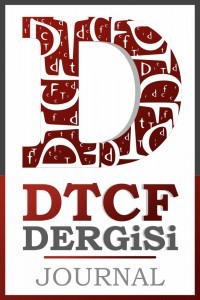FENOMENOLOJİ VE EDMUND HUSSERL'DE APAÇIKLIK EVIDENZ PROBLEMİ
Bu makalede, ilkin, kısaca fenomenolojik tavır, fenomen ve öz kavramları ile fenomenolojik yöntem söz konusu edilecektir. Bundan sonra, fenomenolojik yöntemin iki basamağı olan fenomenolojik redüksiyon ve fenomenolojik refleksiyon üzerinde durulacaktır. Böylece, özün kendisini göstermesi, fenomen olması imkanını araştıran ve sağlayan Husserl'in fenomenolojisinde salt fenomen olan salt öz'e ya da salt bilince nasıl ulaşıldığı ortaya konulacaktır. Daha sonra, evidenz kavramı üzerinde durulacak ve Husserl'in fenomenolojisinde evidenz problemi ele alınacaktır. Ayrıca, yeri geldikçe, bu problemin Platon, Descartes, Kant gibi ünlü filozoflarca nasıl ele alındığı ve nasıl çözüldüğü söz konusu edilecek, bu çözümler, zaman zaman Husserl'inkiyle karşılaştırılacaktır. Sonuçta, elde edilen bulgulara göre, Husserl değerlendirilecek; "idealizm", "ampirizm", "solipsizm" ve "septisizm" gibi düşülmesi muhtemel olan felsefi görüşlere düşüp düşmediği tesbit edilecektir.
Anahtar Kelimeler:
Felsefe, Fenomen, Fenomenoloji, Fenomenolojik Yöntem, Transandantal Fenomenoloji, Fenomenolojik Redüksiyon, Fenomenolojik Refleksiyon, İntensiyonalite, Evidenz.
Phenomenology and the Problem of Evidence in Edmund Husseri
In this article, first, the phenomenological approach and such concepts as the phenomenon and the essence and the phenomenological method will be discussed. Then the two stages of phenomenological method, that is, phenomenological reduction and phenomenological reflection will be taken into consideration. Thus how the püre essence or püre consciousness, which is the püre phenomenon in the phenomenology of Husserl, who carried out a research into the essence and who proved that the essence is the phenomenon, has been reached will be revealed. Then, the concept of evidence will be discussed, and the problem of evidence in Husserl's phenomenology will be studied. Furthermore, how this problem was dealt with and solved by the famous philosophers such as Plato, Descartes, Kant etc, will be discussed and these evaluations will be compared with Husserl's from time to time. Finally, depending on thefindings, Husserl will be assessed, and determined whether he was inclined to probable philosophical ideas such as "idealism", "empiricism", "solipsism" and "scepticism" or not.
Keywords:
Phenomenon, Phenomenology, Phenomenological Method, Transcendental Phenomenology, Phenomenological Reduction, Phenomenological Reflexion, Intentionalite, Evidence,
___
- HUSSERL, Edmund. (1973). Cartesian Meditations. (Çev.Dorion Cairns). Martinus Nijhoff, Fifth Impression.
- HUSSERL, Edmund. (1969). Ideas. (Çev.W.R.Boyce Gibson). London: Fifth Impression.
- HUSSERL, Edmund. (1995). Kesin Bir Bilim Olarak Felsefe. (Çev.Tomris Mengüşoğlu). İstanbul: Yapı Kredi Yayınları.
- İPŞÎROĞLU, Mazhar Şevket. (1939). Fenomenoloji. Felsefe Semineri Dergisi. 1,153-164.
- MENGÜŞOĞLU, Takiyettin. (1945). Fenomenoloji Felsefesi. Felsefe Arşivi. 1(1), 47-74.
- MENGÜŞOĞLU, Takiyettin. (1976). Fenomenoloji ve Nicolai Hartmann. İstanbul: İstanbul Üniversitesi Edebiyat Fakültesi Matbaası.
- SÖZER, Onay. (1976). Edmund Husserl'in Fenomenolojisi ve Nesnelerin Varlığı. İstanbul: İstanbul Üniversitesi Edebiyat Fakültesi Yayınları.
- TİMUÇİN, Afşar. (1976). Descartes. İstanbul: Hilal Matbaası, 2.bsk.
- UYGUR, Nermi. (1972). Edmund Husserl'de Başkasının Ben'i Sorunu. İstanbul: İstanbul Üniversitesi Edebiyat Fakültesi Yayınları.
- Yayın Aralığı: Yılda 2 Sayı
- Başlangıç: 1942
- Yayıncı: Ankara Üniversitesi
Sayıdaki Diğer Makaleler
HALK-DEVLET-SANAT ÜÇGENİ İÇİNDE AZİM AZİMZADE
POLONYALI ŞAİR ADAM MİCKİEWİCZ ve KIRIM SONELERİ
Teneke Trampet'te Yapısal Özellikler
YENİ TARİHSELCİLİK VE RÖNESANS KÜLTÜRÜ
Üstkurmaca Metinlerin Okunması
ANKARA'DA ÜST SOSYOEKONOMİK DÜZEY 10-17 YAŞ GRUBU ÇOCUKLARIN BOY VE AĞIRLIK DEĞERLERİ
FENOMENOLOJİ VE EDMUND HUSSERL'DE APAÇIKLIK EVIDENZ PROBLEMİ
